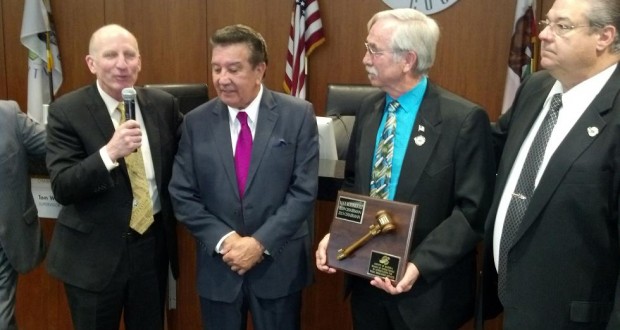MADERA COUNTY – With a lot of misinformation being bandied about concerning whether or not the Madera County Board of Supervisors voted to give themselves a raise, we contacted Chief Administrative Officer Eric Fleming and Director of Human Resources Adrienne Calip for clarification.
On Jan. 13 of this year, CAO Fleming appeared before the Board to address the fact that the Supervisors have not had a salary adjustment in over seven years – the longest of any group County-wide.
The salaries of the Board members are tied to those of Superior Court judges, and had been set at 40 percent of the judges’ compensation. November 2007 was the last time those on the bench had received an increase in pay until 2013, according to HR Director Adrienne Calip.
In 2013 and again in 2014, the Board voted to forego their raises when the judges received an increase, “in light of the sacrifices that continue to be made by Madera County employees during these difficult fiscal times.”
Had they accepted increases, their pay would have risen from $71,515 to $73,844 annually.
“Your board has foregone the cost of living adjustments [COLAs], and your pay has fallen further and further off where it should be,” Fleming told the Board in January, noting that their salaries were considerably lower than nearly all the elected officials in Madera County, and that all other classifications of employees would be receiving 5 percent COLAs.
In the years between 2007 and 2015, County employees received yearly increases of between 2 and 5 percent, though they also suffered through furloughs from January 2010 to June 2013, effectively reducing their monthly income by 9.23% with some exceptions, depending on their job classification.
Fleming pointed out that Supervisors in Merced County receive 53.23 percent of judge’s salaries, and in Fresno County, it’s 60 percent. He recommended that the Board raise their salaries to 50 percent of what judges receive.
In addressing the workload for Madera County Supervisors, Fleming noted that 87 percent of Madera County communities are unincorporated, and that the county has the highest number of special districts of the three counties – Madera, Merced and Fresno.
“Most of the complaints come from special districts. We have highest number of special districts, and the highest number of residents residing in those districts, to whom we deliver services. Your board is well aware of how much business and activity that generates.”
A higher number of incorporated cities takes a lot of the workload off a County Board of Supervisors through additional city administration, additional management teams, city councils and more personnel handling and providing services for county citizens, Fleming told the Board.
“We have only two incorporated cities. Merced County has six, and Fresno fifteen. Those are the real indicators you need to think about; how busy your board is in relation to those other boards.”
After input from the public, and much discussion by the Board, a motion was made to bring the issue back for discussion at the next regular meeting, but that motion was voted down with a 2-2 tie (Max Rodriguez was absent). Supervisors Brett Frazier and David Rogers voted “no” to discussing the issue further.
Chairman Rogers made a point of clarifying that the Board itself does not request that a salary increase be put on the agenda.
In January 2015, the Board received an increase for the first time since 2007, raising their pay from $71,515 to $73,844. This year, they did not vote to waive the adjustment that would keep them in line with the 40 percent of judges’ salaries, and this brought them back into alignment with the increases of the past two years.
On Mar. 17, CAO Fleming brought the issue to the Board again, reiterating his position that the Supervisors should have a salary more commensurate with surrounding counties, and with their workload. His recommendation was that the Board accepts the 5 percent COLA that had been granted to all County department heads.
“By accepting this COLA, the Board’s base pay, as a percentage of a judge’s pay, would increase from 40 percent to 42 percent, or from $73,844 to $77,536 annually,” said Fleming.
Supervisor Farinelli made a motion that the increase to 42 percent should only be given to those who had served at least eight years, as longevity pay, as is afforded to other long-serving County employees. After discussion, the motion was amended to apply only to those Supervisors who are entering their sixth year of service.
One issue that was raised during the public comment was the contention that this is a part-time job, and Supervisors should be paid accordingly.
In June 1999, Madera County Ordinance No. 530 addressed this issue and was amended to read, “In recognition of the fact that the complexities facing the County of Madera today and into the future, and the time commitments required to perform the duties of a member of the Madera County Board of Supervisors today, have transformed the job of a County Supervisor from a part-time to a more-than-full-time position.”
“We sit on over 30 commissions each,” said Chairman Rogers during the January meeting. “People need to understand. I don’t spend 20, 30, even 40 hours a week; I serve 7 days a week, and that usually ends up being 60 to 80 hours. The amount of knowledge and research it takes to make informed decisions is arduous. We serve in a quasi-judicial role for every issue that comes before us. We have to understand planning procedures and laws, the workings of every single department, and educate ourselves on a myriad of subjects. That’s not a complaint. We love to serve; that’s why we do this job.”
On Apr. 7, the matter came back before the Board for a vote, with CAO Fleming reminding them that this is not a raise, it is an adjustment, long overdue. District 5 Supervisor Tom Wheeler noted the reasons for his support of the motion.
“As I’ve gone over what other elected officials in the County make, I see that the County Assessor makes $48,900 more than we do, Auditor Controller makes $64,000 more, the County Clerk makes $32,600 more, the District Attorney makes $91,000 more, the Sheriff Coroner makes $69,000 more and the Tax Collector makes $43,700 more. And we oversee all these departments, along with 1,100 employees, and yet we’re this far out of line with other supervisors. I have never had a job where I’ve put as many hours in as I have in this 8 1/2 years, even when I had two jobs.”
Max Rodriguez agreed. “The people who see what we do will know that this is not outrageous. It’s not a large amount, and it’s not a raise, it’s an adjustment.”
After much discussion, the Board voted 5-0 to approve the motion, and Madera County Ordinance No. 530F reads that County Supervisors, upon commencing their sixth year of service, would be compensated at 42 percent of Superior Court judges, up from 40 percent. Only District 5 Supervisor Tom Wheeler, with over eight years of service, and District 4 Supervisor Max Rodriguez with over ten years, qualify for the increase.
Supervisors David Rogers (five years service), Rick Farinelli (three years), and Brett Frazier (in his first year) have not served long enough to qualify, and their salaries remain at 40 percent.
The changes took effect on July 1, and any subsequent increases to the salaries of Superior Court judges prompt an adjustment to the Supervisors’ compensation, unless they elect not to accept the increase.



